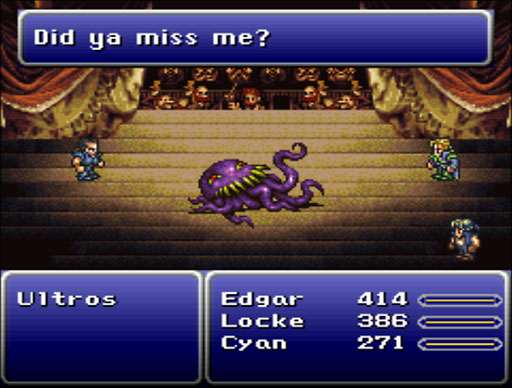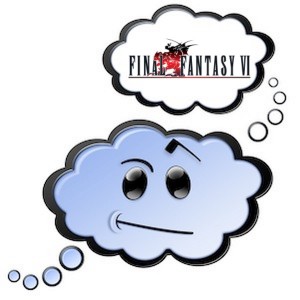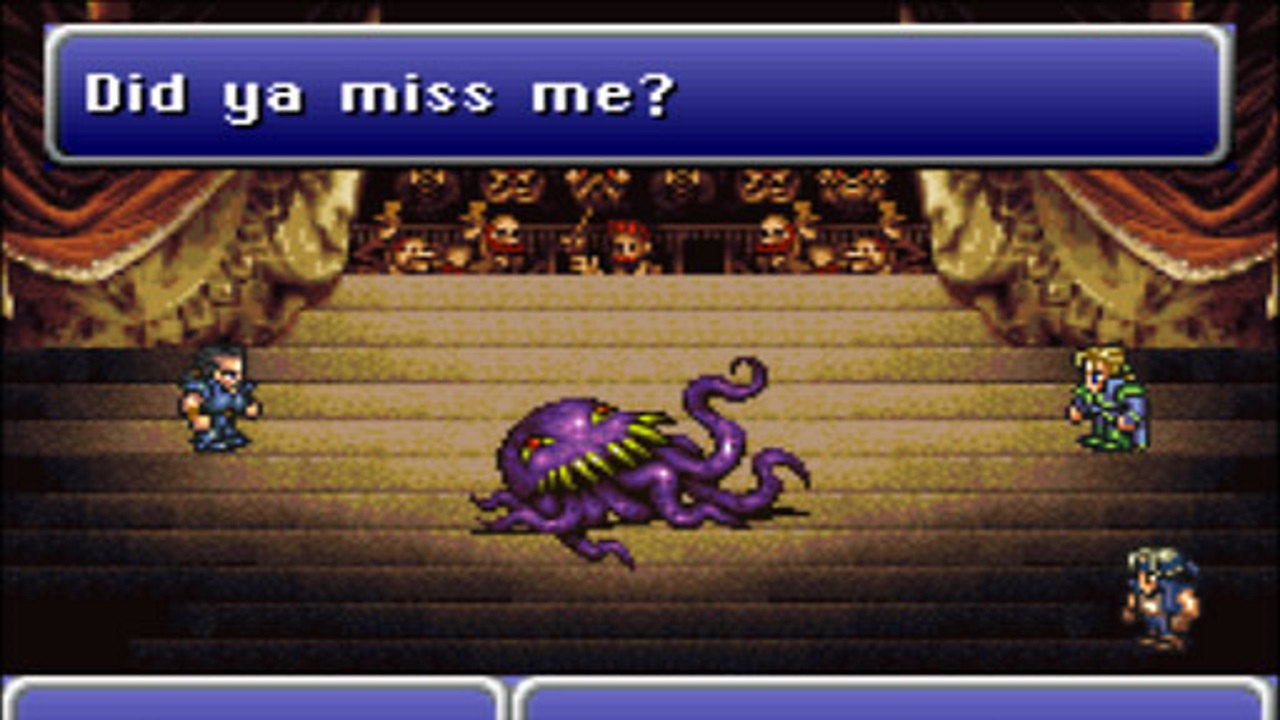 Ben Adams, John Perich, Richard Rosenbaum, Shana Mlawski and Red Pages Podcast’s Justin Bortnick continue the Final Fantasy VI book club with Week 3! Join us for a discussion of the Opera, Ultros and the tension between narrative and gameplay.
Ben Adams, John Perich, Richard Rosenbaum, Shana Mlawski and Red Pages Podcast’s Justin Bortnick continue the Final Fantasy VI book club with Week 3! Join us for a discussion of the Opera, Ultros and the tension between narrative and gameplay.
→ Download the Final Fantasy VI Podcast
Possible Episode Titles
- “Nobody Puts Ultros in the Corner”
- “Kefke 2012”
- “You’re watching Romeo and Juliet and an octopus comes on stage….”
- “Is the narrative the thing, or is the gameplay the thing?”
- “Why Everyone in Australia Lies”
- “Gau Can Be the Leader If He Wants to Be”
The Overthinking It Book Club
The book club has always been an experiment to see if we, the worldwide community of Overthinkers, can have as much fun looking at a work of literature as we have when we talk about movies, TV shows, and music. Now, we’re taking that idea into a whole new medium, and turning our eyes to the world of interactive fiction – fancy talk for video games. Beginning the week of October 15, we’re going to spend a month and a half playing the RPG classic Final Fantasy VI, in honor of the 20th Anniversary of the game’s North American release.
Get The Game
If you have the game already, great! Time to dust off the SNES and get cracking. Otherwise, the game can be acquired for iOS and Android.

The Syllabus
We’ve divided the game into six roughly equal chunks. You’ll get the most out of the club if you have played through these sections by these dates:
- Introduction: October 15
- Week 1: October 22 (Chapters 1-2: Narshe through the Returner’s Hideout)
- Week 2: October 29 (Chapters 3-5: Locke’s Scenario, Terra’s Scenario and Sabin’s Scenario)
- Week 3 (this podcast): November 5 (Chapters 6-7: From Narshe to Zozo and the Opera House all the way to Vector)
- Week 4: November 12 (Chapters 8-10: From Vector through the Sealed Gate, Thamasa, the Floating Island, and the World of Ruin)
- Week 5: November 19 (Chapter 11: Cid’s Island to Darril’s Tomb)
- Week 6: December 3 (Chapter 12: Kefka’s Tower and wrap-up)
The Forums
For our discussion, we’re going to use a special section in the Overthinking It Forums. Friday before each section begins, we’ll open up a forum for the coming week with some study questions to get our discussion started. As you play over the weekend, you can answer our questions in the week’s forum, start your own discussion topics there, and chime in on discussions that others have started. Everything up to and including the week’s section of the game is fair game for discussion—but if you’ve played ahead, no spoilers for what is to come! (We’ll open up a “all-game” thread for those.)

The Podcast
Sometime mid-week, we’ll release a podcast where a panel of Overthinking It writers and guests will talk about the game. We’ll talk over the week’s gameplay, address some of the study questions, and highlight our favorite discussions from the forums.

Lots of good stuff here! I’m curious – If you don’t bring Edgar to the opera house, does Setzer just join the party on an honest coin flip?
On the point of the missable, character-dependent aspects of the plot: it’s worth noting that game designers from the 16-bit era tried a bunch of variations on this idea. As someone pointed out, the cut-scenes in FF6 don’t have any bearing on the gameplay. But the 1996 JRPG Star Ocean tracks relationship stats between all of the characters in your party, and if you manage to watch enough of the cut scenes, this translates into a non-trivial combat buff. (Characters that care about each other will get free counterattacks if their buddy gets attacked, or something like that.) It’s a pretty complex system: not all character pairings can care about each other enough for the buff to kick in; scenes that advance your relationship with character A may degrade your relationship with character B, etc.
Another explanation for the hidden cut-scenes is that they increase replay value. In Seiken Densetsu 3, this was an explicit design feature: there are six playable characters, but at the start of each game you choose one to be the main character, and two to be his/her sidekicks. As you play through the game, you sometimes bump into the characters that you DIDN’T choose, who are running around trying to solve their own personal quests without your help.
The coin is still discovered as two headed, setzer’s charmed by it though.
In regards to stage plays in video games it has been suggested that Super Mario 3 is actually nothing but a play. The levels are called stages, the background in several scenes seemed bolted onto a backdrop, and the start menu opens with a curtain opening. If the game is two players you have to choose a role, Mario or Luigi.